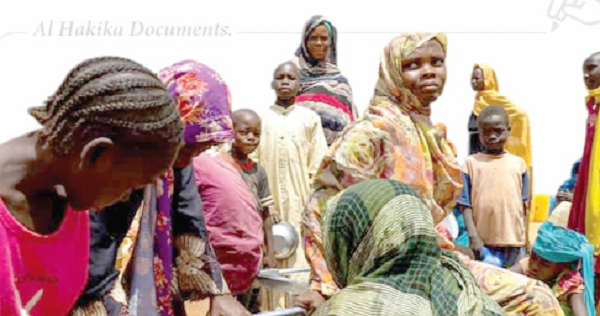It is interesting to note that since the conflict began in April 15, 2023, global and regional communities have focused strongly on the humanitarian crisis, spurred by the massive displacement of individuals forced from their homes in different parts of Sudan.
A large number of women, children and the elderly have suffered a lot of atrocities at the hands of the Rapid Support Forces (RSF.)
This conflict has led to mass displacements and human rights violations, with over 100 cases of sexual violence recorded by the UN.
Between May 29 and June 2, 2023, multiple fires broke out in Mistri, predominantly inhabited by the Masalit ethnic community, who have been subjected to relentless attacks by the RSF and allied Arab militias.
During this attack, houses were burnt amid accusations against the Nuba people of murder and slaughter, with the words "As you condemn, you will be condemned," indicating a cycle of revenge.
Approximately 3,750 square meters, or more than 60 per cent of the city's area, were destroyed. It was also found out that in all these attacks, the rebels were targeting specific groups and methods such as burning villages, poisoning water sources and destroying livestock to deter people from returning.
In Mestiri, these actions affected Masalit and other minorities.
These attacks targeted villages west of El Fasher, inhabited mostly by the Zaghawa ethnic group, killing at least 15 people.
Interestingly, these areas witnessed severe destruction as militias launched a coordinated three-day offensive, causing widespread destruction and forcing many residents to flee; all in the name of an “ethnic cleansing.”
The term "ethnic cleansing" and genocide allegations have been directed against the activities of the RSF militia in Darfur.
There are also reports of an attempted assassination of a Sudanese human rights worker for his humanitarian efforts, such as providing water in devastated areas.
The Darfur region has been heavily affected by fires, particularly in West Darfur State, where the highest frequency of incidents was recorded.
El Geneina, the capital of West Darfur state, and the village of Mistri saw the most severe fire damage.
A new wave of attacks, killings and rape by the RSF launched a deadly attack in the village of Takai northeast of Para, targeting a car transporting sick women and children from a nearby clinic.
The attack resulted in casualties including Mohamed Ali al-Rifai, Mariam Brima Mohamed Tahir, Najwa Arbab, Haidar Bashir and Haj Bashir.
The massacre
On April 2, 2024, a rapid support force armed with four combat vehicles and 50 vehicles launched an attack on the village of Labana in South Kordofan to loot livestock and property.
The attackers surrounded the villagers, set fire to their homes and many of the dead were among the population unable to flee.
Exclusive reports reveal that the RSF is involved in widespread burning across Darfur, as part of an apparent strategy to prevent African tribes from returning.
180 fires in 100 villages across Darfur have been documented.
These show patterns of ethnic cleansing and ongoing massacres in El Fasher and Mershing in South Darfur.
Since April 2023, the Resilience Information Centre has been tracking more than 180 fire incidents in more than 100 villages, towns and cities. One expert identified these events in Darfur as a feature of "ethnic cleansing". Conflict and atrocities continue in Sudan.
In initial discussions between the Sudanese Armed Forces and the Rapid Support Forces in Jeddah, explicit agreements on the protection of civilians were reached.
These agreements underscore the commitment to protect basic needs critical to survival such as food, agricultural areas, crops and livestock. In addition, they strictly prohibit looting and destruction.
Consensus
Humanitarian operations and protection of humanitarian personnel and assets, including adherence to the fundamental humanitarian principles of humanity, impartiality, neutrality and independence, ensuring the unhindered and rapid delivery of humanitarian assistance and facilitating the movement of aid workers essential to their duties.
Despite these international peace agreements and calls as stipulated in the Jeddah Agreement, the militia has consistently violated these conditions, intensified hostilities, strengthened its military presence and expanded its operations to civilian areas.
Their actions have escalated beyond obstructing humanitarian efforts to committing massacres and grave violations against civilians in multiple Sudanese areas including Jazira, Kordofan, Darfur and Khartoum.
The RSF reportedly detained several UNICEF humanitarian trucks en route to El Fasher to address the escalating food and health crisis in camps for displaced persons, particularly amid malnutrition among children.
The militia had previously threatened to block humanitarian access.
Rape Statistics
The (Together Against Rape and Sexual Violence) campaign revealed that 81 cases of rape of women were documented during the period from December 15, 2023 to February 29, 2024, indicating that 32 per cent of the victims were children.
The campaign indicated in its report that 43 per cent of the cases were documented in the Gezira region, 27 per cent in Central Darfur, 13 per cent in the White Nile, and 11 per cent of the rape cases from North Darfur, the report stressed that the figures reflected the tragic reality of the rape cases that were committed by the militia.
The African Centre for Justice and Peace Studies reported that it received documented information about the exposure of about 33 displaced women in Kalma camp in South Darfur to sexual violence outside the camp during the period between November 13 and December 20, 2023 by members of the Rapid Support and allied foreign militia.
Child Kidnappings
Such crimes against children are particularly egregious, targeting the most vulnerable and threatening their safety and well-being.
The United Nations has noted a significant increase in child abductions globally, especially in conflict zones where such acts are used to terrorise communities, which coerce children into participating in hostilities.
If the current pace of violations continues, the region could face an unprecedented humanitarian crisis.
The writer’s email:
prosperkay202@gmail.com

